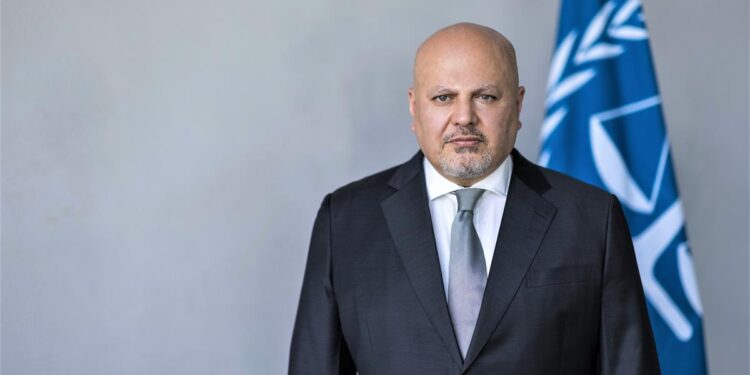By Thomas Verfuss in The Hague
ICC Prosector Karim Khan QC has sent a list of six candidates to become his deputies to Silvia Fernández de Gurmendi, the president of the Assembly of States Parties to the Rome Statute, the court’s founding treaty. The ASP will make the ultimate selection of the two deputies, one for investigations and one for prosecutions, thus restoring the system of the initial years of the ICC. In recent years, the ICC has only had one deputy prosecutor, James Stewart of Canada.
Khan led the preselection panel himself. He presents two lists to the 123 states parties: one with female candidates only, and one with only candidates that are francophone or in any case from another civil law country. This is to ensure gender balance (as he is a man), to ensure that the two principal legal systems of the world, common law (which has its origins from the English system in which Khan was trained) and civil law (the Roman/French tradition) are represented in the 3-person OTP leadership, and to make sure somebody in the leadership team speaks good French, one of the two working languages of the court (according to francophone journalists questioned by Journalists For Justice, Khan does not speak noteworthy French). “I consider it extremely important that the office benefits from a Deputy elected from each of these separate lists”, Khan writes in his letter to Fernández.
According to the Rome Statute, candidates must be “persons of high moral character, be highly competent and have extensive practical experience in the prosecution or trial of criminal cases“.
Two of the names on the lists are well-known figures in The Hague:
Paolina Massidda is an Italian lawyer who has been leading the Office of Public Counsel for Victims (OPCV), which is loosely attached to the ICC Registry, for many years. The OPCV coordinates the representation of victims of atrocity crimes during ICC cases. The eloquent and outspoken jurist is very fluent in both French and English.
Alex Whiting, a Yale graduate and long-time professor at Harvard Law School is widely perceived as American in The Hague, but profited from his dual citizenship to get on the francophone list. He has very extensive experience in international criminal prosecutions: he started as senior trial attorney at the International Criminal Tribunal for the Former Yugoslavia (ICTY) in 2002, has already worked at the ICC Office of the Prosecutor (OTP) as coordinator of investigations and prosecutions successively, and is currently deputy prosecutor of the Kosovo Tribunal which also has its seat in The Hague.
This is are the full lists as submitted by Khan to Fernández:
“Accordingly, I nominate these candidates (in alphabetical order):
List A
Ms. Domaradzki, Sylvia (Canada)
Ms. Khan, Nazhat Shameen (Fiji)
Ms. Massida, Paolina (Italy)
List B
Mr. Niang, Mame Mandiaye (Senegal)
Ms. Paz y Paz Bailey, Claudia (Guatemala)
Mr. Whiting, Alex (France)”
The fact that the outgoing deputy prosecutor is Canadian, diminishes the chances of a new Canadian candidate. Diplomats like rotation among countries and regional groups.
The preselection panel uses different wordings to describe the suitability of the candidates:
“Would perform well” for Ms. Domaradzki, Sylvia (Canada),
“Outstanding candidate who would make a truly exceptional Deputy Prosecutor”, for Ms. Khan, Nazhat Shameen (Fiji)
“Would be a capable Deputy Prosecutor” for Ms. Massida, Paolina (Italy),
“Would make an excellent Deputy Prosecutor” for Mr. Niang, Mame Mandiaye (Senegal),
“Would be successful in the role of Deputy Prosecutor” for Ms. Paz y Paz Bailey, Claudia (Guatemala),
“Would be a huge asset to the Office of the Prosecutor and an excellent Deputy Prosecutor for Mr. Whiting, Alex (France).
Emphasis added by JFJ.
The states are not bound by the initial short list proposed. In fact, none of the candidates on the short list that was prepared last year for the election of the new Prosecutor was eventually elected. The general dissatisfaction with the short list led to months of chaotic negotiations, no successful consensus choice could be made as planned at the ASP session in December. Khan was finally elected at a special session in February.
The election process has often been informally described by professional observers as circus, farce or tragicomedy.
During the long selection process there was also much debate about sexual harassment allegations against one or more candidates. NGOs complained that these issues had not been sufficiently investigated. It was lamented that no good procedures for a thorough vetting of the candidates were in place.
In his letter, Khan speaks only with one sentence about the vetting procedure: “The assistance of the Independent Oversight Mechanism (“IOM”) was initiated in order to ensure the candidates met the specified requirements, as detailed in the annex to the 7 July 2021 decisions of the Bureau of the Assembly.”
The website of the ASP says:
“Article 42(3) of the Rome Statute requires that each Deputy Prosecutor be of “high moral character”. Accordingly, and as indicated in the proposal adopted by the Bureau of the Assembly on 7 July 2021, any allegation of misconduct against any of the candidates listed here may be submitted confidentially to the Independent Oversight Mechanism (IOM) by email at IOM.Vetting@icc-cpi.int, together with supporting information and documentation, no later than 24 October 2021. These allegations will be treated confidentially by the IOM in accordance with the procedure outlined in the annex of the Bureau decision.”
The ICC can be assured of the vigilance of some NGOs that will try to make sure that this time the vetting satisfies the requirement they deem necessary.
Khan’s full letter to Fernández and more information on all candidates can be found on the ASP website at:
https://asp.icc-cpi.int/iccdocs/asp_docs/Elections/DPROS2021/ICC-ASP20-DPROS-Shortlist-ENG.pdf
Previous JFJ stories on the chaotic process of the election of the Prosecutor:
https://jfjustice.net/search-for-the-next-icc-prosecutor-makes-little-progress/
https://jfjustice.net/first-time-in-history-a-vote-on-who-becomes-new-icc-prosecutor/







